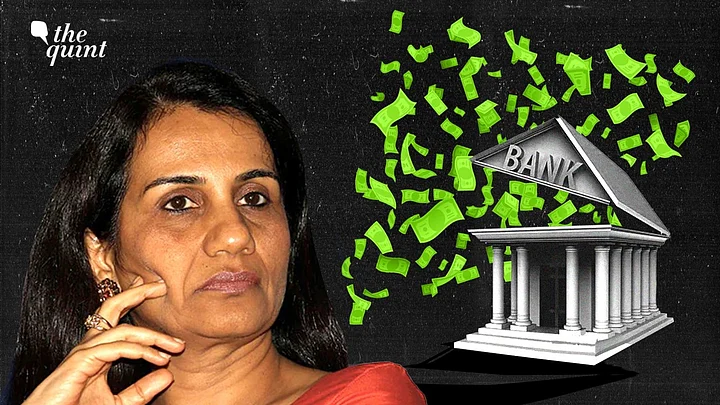In the deepening scandal surrounding the arrest of Chanda Kochhar, the Former CEO of ICICI Bank, there is much more than fall from grace of an iconic woman who led a financial icon of India's liberalisation programme that kicked off in 1991.
Only a detailed trial will reveal whether Ms Kochhar with her star-studded career that won her the Padma Bhushan— India's third highest civilian honour, is a victim of greed, circumstances, or sheer naivete. But the spotlight on her personality is such that they hold caution signs for every ambitious banker.
The Downfall of the Banking Baroness
Kochhar's suspicious association with the crisis-hit Videocon group is at the heart of the scandal, and raises hard questions: Do a private banker's family members not have the right to a career or entrepreneurial ambition with their own identity? If any kind of legal corruption is involved when a private enterprise makes a business decision involving another private entity. Where do professional ethics and good business practice figure in this aside from the legality of alleged wrongdoing?
Is there a political vendetta lurking somewhere given the Videocon group founder Venugopal Dhoot's opposition connections, after the Congress lost power to the BJP led by Narendra Modi in 2014? Questions are easy, answers not, though the political vendetta angle looks flimsy in the context of the mammoth bankruptcy involving the flagship Videocon Industries of the Dhoot family's business empire.
The Central Bureau of Investigation(CBI) says Ms Kochhar's ICICI tenure saw a Rs 3250 crore loan disbursement to the Videocon group and within days, her husband Deepak's private company received a Rs 64 crore loan from an entity controlled by the Dhoot family. Venugopal Dhoot has just been arrested in a case that involves an alleged violation of banking laws, regulatory guidelines, and ICICI's own loan policy. Ms Kochhar denies wrongdoing but her career has faced a disturbing turn at its peak.
Prima facie, as they say, there is the significant irregularity of a large bank's CEO influencing a controversial decision linked to her husband's career. Given that the Videocon group has been sinking into a mountain of unpaid debt involving banks, the case cannot get any more curious than this.
Lessons in Banking & Bankruptcy
But whatever the detail and irrespective of whether Ms Kochhar gets convicted or not, the case reveals five signs of caution that a banker must exercise in an increasingly complex financial universe.
A private bank has a public character. It is not for nothing that the word "public" exists in the name of listed companies. Accountability to shareholders has an underlying responsibility for a CEO who resembles a public figure, such as a politician or a civil servant. This can be lost sight of in a context where a private sector entity's deal with another private entity may be purely seen as one involving only a business risk.
In the case of ICICI Bank, it is important to bear in mind that it is officially a "systemically important" bank in India, and hence, extra accountability to the government and the Reserve Bank of India is implicit.
Being seen as fair is critical. A bank leverages money from depositors and lends to borrowers but alongside profit and risk, there is the element of fair play that is vital in business decisions. Every loan lent to a company must also answer how it weighs with respect to another company that might have been rejected in a loan bid. Depositors, borrowers, shareholders, regulators, and employees alike need to feel convinced that there is a rule book that goes with a playbook.
'Private Entities Come With Public Accountability'
3. Chinese walls extend to bedrooms: This is a tricky part. While public figures, especially politicians, are clearly linked to their family members in decision-making, the area is relatively fuzzy when it comes to private sector executives. However, after the Kochhar episode, senior bankers must be prudent enough to disclose where relationships can hurt their careers, or indeed, demand an extra pound of flesh from their boards if family members have to forego career options because of a banker's constraints.
4. Beware the whistleblower: There is the old chestnut, "Caesar's Wife Must be Above Suspicion" that says public figures will bear close scrutiny. That saying now may be rephrased as "Cleopatra's Husband Must be Above Suspicion."
In the Kochhar case, Activist-shareholder Arvind Gupta turned whistleblower to unearth disturbing details that led to Ms Kochhar's disgrace.
With increasingly educated employees turning into potential dissidents in large companies— and with social media being an easy tool for dissemination of facts, conjectures, rumours, and allegations alike, bankers need to go that extra mile. The old tale about things being sub judice or claims that private entities have no general public accountability is increasingly unacceptable.
5. Prefer propriety to politics: Ms Kochhar was an active social media supporter of Prime Minister Narendra Modi's Swachha Bharat campaign but that did not help clean up her own image when she lost her CEO's job in 2018. Regimes change, central bank heads change, and boardroom compositions change. A banker cannot put relationships over processes. Even relationships cultivated over decades can fail when it comes to explaining decisions. A banker's job is a lonely one.
(The writer is a senior journalist and commentator who has worked for Reuters, Economic Times, Business Standard, and Hindustan Times. He can be reached on Twitter @madversity. This is an opinion piece and the views expressed above are the author’s own. The Quint neither endorses nor is responsible for the same.)
